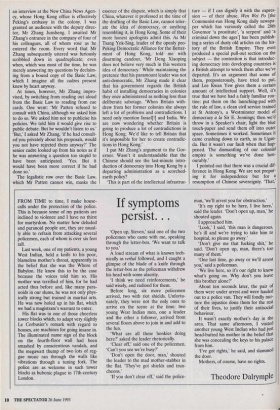If symptoms
persist.. .
FROM TIME to time, I make house- calls under the protection of the police. This is because some of my patients are inclined to violence and I have no thirst for martyrdom. No matter how deluded and paranoid people are, they are usual- ly able to refrain from attacking several policemen, each of whom is over six feet tall.
Last week, one of my patients, a young West Indian, held a knife to his poor, blameless mother's throat, apparently in the belief that she was the Whore of Babylon. He knew this to be the case because the voices told him so. His mother was terrified of him, for he had acted thus before and, like many para- noids in our slums, he was not only phys- ically strong but trained in martial arts. He was now holed up in his flat, which we had a magistrate's warrant to enter.
His flat was in one of those cheerless tower blocks which, to adapt very slightly Le Corbusier's remark with regard to houses, are machines for going insane in. The illuminated name sign of the block on the fourth-floor wall had been smashed by conscientious vandals, and the megawatt thump of two lots of reg- gae music ran through the walls like vibrations through a tuning fork. The police are as welcome in such tower blocks as bubonic plague in 17th-century London.
`Open up, Steven,' said one of the two policemen who came with me, speaking through the letter-box. 'We want to talk to you.'
A loud stream of what is known tech- nically as verbal followed, and I caught a glimpse of the blade of a knife through the letter-box as the policeman withdrew his head with some alacrity.
`I think we need reinforcements,' he said wisely, and radioed for them.
Before long, six more policemen arrived, two with riot shields. Unfortu- nately, they were not the only ones to arrive on the scene at the time: two young West Indian men, one a leader and the other a follower, arrived from several floors above to join in and add to the fun.
`What are all these honkies doing here?' asked the leader rhetorically.
`Clear off,' said one of the policemen. `Can't you see we're busy?'
`Don't open the door, man,' shouted the leader to the mad mother-stabber in the flat. 'They've got shields and trun- cheons.'
`If you don't clear off,' said the police- man, 'we'll arrest you for obstruction.'
`It's my right to be here, I live here,' said the leader. 'Don't open up, man,' he shouted again.
I approached him.
`Look,' I said, 'this man is dangerous, he's ill and we're trying to take him to hospital, so please go away.'
`Don't give me that flicking shit,' he said. 'Don't open up, man, there's too many of them.'
`One last time, go away or we'll arrest you,' said a policeman.
`We live here, so it's our right to know what's going on. Why don't you leave this brother alone?'
About ten seconds later, the pair of them were under arrest and were hauled out to a police van. They will fondly nur- ture the injustice done them for the rest of their lives, to justify their antisocial behaviour.
It wasn't exactly mother's day in the area. That same afternoon, I visited another young West Indian who had just head-butted his mother in the belief that she was concealing the keys to his palace from him.
`I've got rights,' he said, and slammed the door.
Mothers, of course, have no rights.
Theodore Dalrymple


























































 Previous page
Previous page